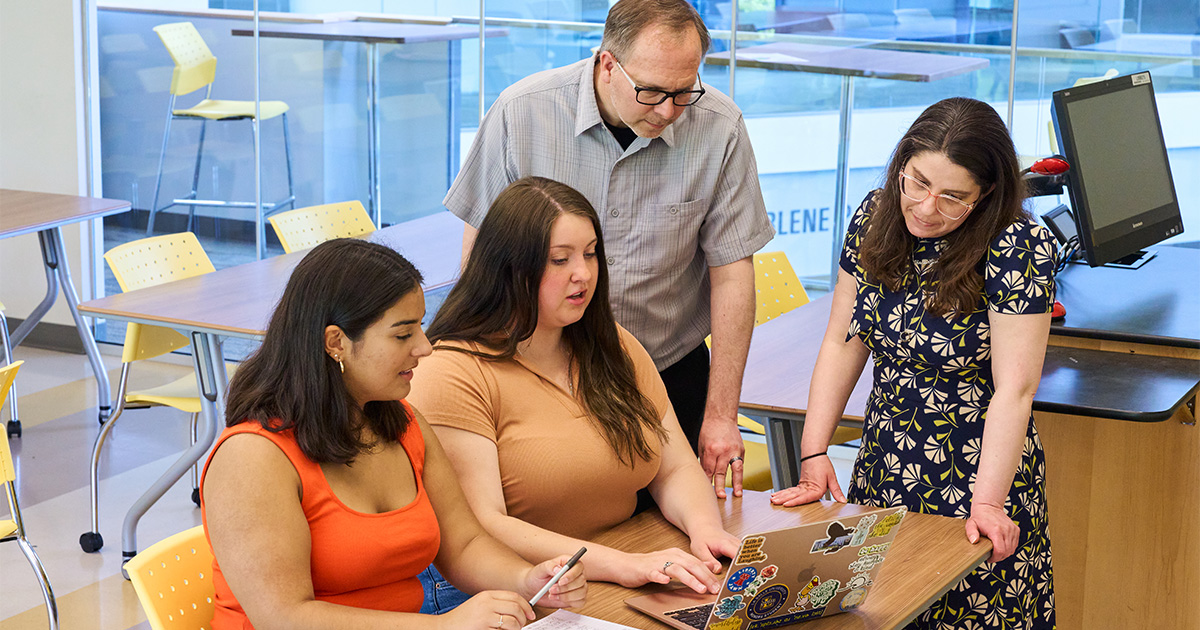La Salle University
Students studying communication sciences and disorders receive hands-on training through faculty-student research.

Left to right: Students Abby Griswold, ‘25, M.S. ‘26, and Mackenzie Everett, ‘25, M.S. ‘26, are instructed by Ryan Husak, Ph.D., CCC-SLP, and Dana Bitetti, Ph.D., CCC-SLP
If you’re a speech-language pathology major at La Salle, you might get a chance to use a video endoscope to observe your professor’s vocal folds. The faculty within the Department of Communication Sciences and Disorders understands this field requires real-life experience—not just looking at pictures of voice boxes in an anatomy book.
“I truly do think our faculty is something that sets us apart,” said Mackenzie Everett, ‘26, M.S., ‘27, who learned about the larynx while looking at the vocal folds of Professor Cesar Ruiz, SLP.D., CCC-SLP, BRS-S, who specializes in swallowing disorders.
There are a few reasons for that, according to Ryan Husak, Ph.D., CCC-SLP, an assistant professor who heads the department.
Each faculty member has their own area of expertise, and they regularly earn authorship on peer-reviewed publications.
Research areas include studying the effects of aphasia therapy during early periods of recovery (Husak), working with children with selective mutualism (Evelyn Klein, Ph.D., CCC-SLP, BCS-CL ASHA Fellow), and looking at the intersection of stigma with people who stutter and are part of the LGBTQ community (James Mancinelli, Ph.D., CCC-SLP).
“We invite and involve our students in our faculty research projects,” Husak added. “Our students often will work alongside us on our own projects, so they are collaborators.”
Everett, for example, has been a research assistant for one of her professors since her freshman year. She’s helping him edit one of his textbooks.
“They get us going the second we walk through the door,” Everett said.
Faculty members regularly publish research with their students, and they also assist students with their own independent research projects.
“We help them shape that topic into an answerable research question, and then provide them with the methodological support they need to address that question,” Husak said.
Associate Professor and Graduate Program Director Dana Bitetti, Ph.D., CCC-SLP, who researches narrative language production in bilingual children, is working with five students (including Everett) on an honors project that examines the effectiveness of AI tools on language sample analysis.
Studying how children acquire language from birth to adolescence can be time-consuming: typically, a speech-language pathologist takes a language sample from the child, then transcribes it, then transcribes any areas of error into the International Phonetic Alphabet, where they can hone in on the errors and identify potential speech disorders.
“With Dr. Bitetti, we ask the question, ‘Is AI able to help make this process more efficient?’” said Abby Griswold, ‘26, M.S. ‘27, an Honors Program student involved in the project.
Early results were mixed: different AI models have varying levels of accuracy. They can “learn” from their errors, but some don’t really “remember” what the students taught them. The honors students are keeping a journal of field notes that could possibly aid in future transcriptions as well as become research they present at state and nationwide conventions.
“We really do try to make assignments practical and meaningful, so they replicate real world practices,” Bitetti said.
The program’s B.S. to M.S. structure is not an accident. Since a master’s degree is required to become a speech-language pathologist, La Salle offers a five-year accelerated program for students to meet the entry-level requirement. Students in the program begin completing clinical observation hours as early as their freshman year, and they often volunteer at La Salle’s on-site Speech-Language-Hearing Community Clinics. Students complete their clinical practicums and provide supervised therapy to clients with speech and language disorders during their fourth and fifth years in the program. Throughout their time at La Salle, students get the opportunity to present at multiple conferences, including the American Speech-Language-Hearing Association Convention.
“My favorite thing so far has been the bonds and friendships formed within the cohort and also with upperclassmen and freshmen,” Everett said. “You truly do become a big speech-y family.”
-Taylor Goebel